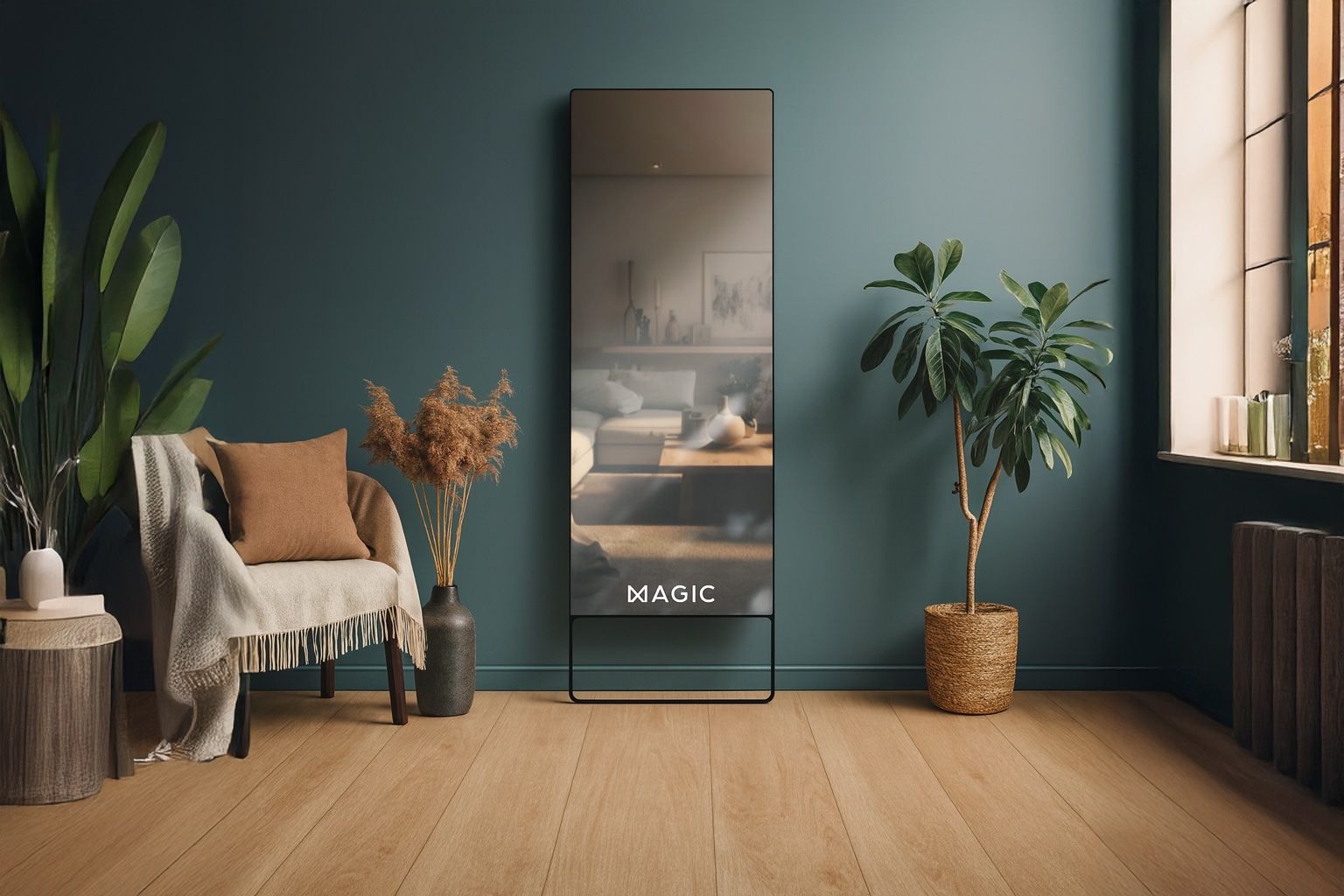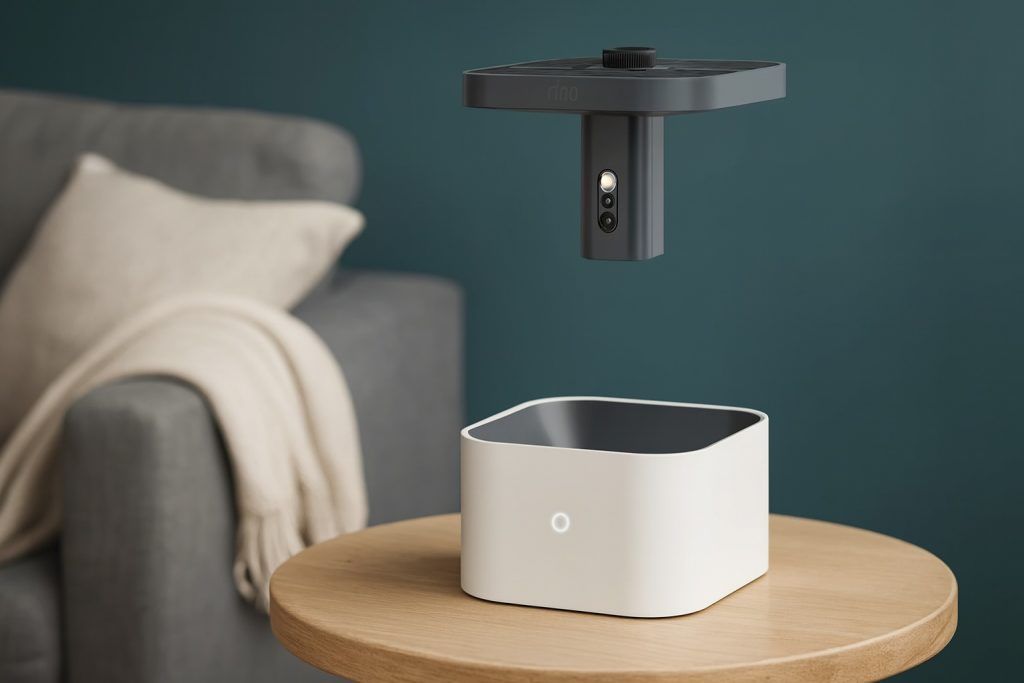Key Facts
- AI Personal Trainer in a Mirror: The MagicFit Smart Fitness Mirror is a wall-mounted, 32-inch HD touchscreen mirror that doubles as an AI-driven personal trainer time.com. It uses a hidden camera and proprietary “ReflectAI” computer vision to count your reps and give real-time form corrections, much like having a coach watching you time.com.
- Interactive Workouts & Content: The device recognizes over 300–400 exercises and offers 100+ classes and multi-week programs led by 25+ trainers (including celebrity athletes as holographic coaches) time.com scotsman.com. Categories range from strength, HIIT, and cardio to yoga, dance, and (coming soon) meditation and sports-specific training magic.fit magic.fit. New workouts are added regularly to keep content fresh scotsman.com.
- Real-Time Feedback & Adaptation: MagicFit’s ReflectAI tech stands out by adapting workouts on the fly. It provides instant feedback on your posture, pace, and range of motion, and can suggest modifications or extra challenges based on your performance scotsman.com. This level of personalization helps maximize each session and reduce injury risk, setting MagicFit apart from standard workout videos scotsman.com.
- Specs and Design: The mirror is sleek and compact – about 150 cm tall x 50 cm wide x 4 cm thick, weighing 19 kg magic.fit. When off, it looks like an ordinary full-length mirror that “blends neatly” into a room scotsman.com. Turned on, it becomes a high-definition interactive display (32″, 1080p touchscreen) magic.fit with integrated speakers. It can lean against a wall or be wall-mounted (bracket included) magic.fit. A built-in camera and sensors track your movement, but remain invisible for privacy when not in use. It also pairs with heart-rate monitors and wearables to display live workout stats scotsman.com.
- Pricing & Membership: The MagicFit mirror retails for roughly £1,499 in the UK (about $1,900) currently, discounted from a regular price of £1,899 scotsman.com. Notably, a lifetime content membership is included free for a limited time, meaning no monthly subscription fees magic.fit scotsman.com. (The lifetime membership is valued at ~£25/month, which MagicFit is waiving for early buyers scotsman.com.) This contrasts with competitors that often require $39–$49 monthly subscriptions for content access goodhousekeeping.com theverge.com.
- Target Users: MagicFit is designed for all fitness levels, from beginners to athletes magic.fit. The AI customizes workouts to your ability and even recommends weight adjustments as you progress magic.fit. It has been especially popular with people who avoid gyms because “they find it too intimidating, they’re too time-poor, or it’s too expensive,” according to MagicFit’s CEO Varun Bhanot time.com. Up to five user profiles are supported, making it suitable for households. There’s also a 30-day risk-free trial – if you’re not satisfied, MagicFit will pick up the mirror and refund you magic.fit.
- Recognition & Momentum: Launched in 2023 by London startup Magic AI, the MagicFit mirror has garnered major accolades. TIME named it one of the “Best Inventions of 2024” for its sleek design and trainer-replacing tech time.com, and Fast Company listed Magic AI among the world’s most innovative companies in 2024 startups.co.uk startups.co.uk. It has attracted high-profile investors (including Sir Richard Branson and sports stars) and raised $5 million in late 2024 to expand operations fundz.net finsmes.com. MagicFit is currently expanding retail presence (available for demo at Selfridges London and via video call, and recently launching in Decathlon stores) magic.fit startups.co.uk.
MagicFit Mirror Overview: An AI Personal Trainer in Your Home
The MagicFit Smart Fitness Mirror is a new breed of home gym equipment that fuses reflective display technology with artificial intelligence. In essence, it’s a full-length mirror that transforms into an interactive workout screen, enabling you to see yourself exercise while a virtual trainer (displayed as a life-sized hologram) appears on the glass to coach you scotsman.com scotsman.com. This mirror’s AI “eyes” watch your form through an embedded camera and motion sensors, and its “brain” (the ReflectAI® system) analyzes your movement in real time. As you work out, MagicFit’s virtual coach will shout out corrections and encouragement – for example, reminding you to straighten your back during a squat or counting down your last few reps magic.fit magic.fit. The instant feedback gives the experience of a personal trainer’s guidance, something reviewers have noted as MagicFit’s killer feature. “The stand-out feature for this mirror has to be the AI tracking… It was engaging and challenging, with enough breaks and exercise changes to keep me going until the end,” said one reviewer who spent a month training with the MagicFit mirror telegraph.co.uk. Unlike a regular workout video, the MagicFit system doesn’t let you slip into bad form or slack off unnoticed – it actively prompts you to improve, just like a human trainer would.
From a hardware standpoint, MagicFit is elegantly minimalist. The mirror itself has a 32-inch 1080p touchscreen display hidden behind one-way glass magic.fit. When powered off, it serves as a normal mirror; when on, the LCD display shines through the reflective surface to overlay fitness visuals (trainers, timers, metrics) on your reflection. The unit is 150 cm tall x 50 cm wide (about 5 ft by 1.6 ft), with a slim 4 cm depth magic.fit, and can be leaned against a wall on its included stand or securely wall-mounted. At ~19 kg (42 lbs), it’s fairly easy to position (professional delivery and installation is offered). The build features a brushed metal frame and hidden wires for a modern look that “doesn’t dominate a room…when it’s switched off, it looks just like a sleek full-length mirror” scotsman.com – no clunky equipment vibe. Behind the scenes, MagicFit houses a suite of tech: an RGB-D camera and 3D motion sensors for body tracking, a quad-core processor for AI computation, stereo speakers for trainer audio, and Bluetooth/WiFi connectivity. It also supports integration with wearables; for example, you can sync a heart rate monitor or Apple Watch so your pulse and calories are displayed on-screen in real time scotsman.com, enriching the feedback. Notably, MagicFit’s display is touch-enabled, so you can navigate menus or adjust settings right on the mirror. (This is a nice advantage over some older fitness mirrors like the original Lululemon Mirror, which had no touchscreen and required a phone app for controls goodhousekeeping.com goodhousekeeping.com.)
User experience on the MagicFit mirror is designed to be as close to a one-on-one personal training session as possible. When you start a workout, a virtual trainer appears—often a celebrity athlete or world-class coach—and greets you by name. MagicFit’s creators partnered with sports stars (e.g. England cricket captain Sir Alastair Cook, sprinter Desirée Henry, footballer Jesse Lingard, and others) to record interactive training programs finsmes.com startups.co.uk. These aren’t just pre-recorded videos; thanks to the AI, the trainer can react to you. If your squat is too shallow or your punches too slow, you’ll hear immediate pointers to adjust your form magic.fit. The system also counts your reps out loud in the coach’s voice, so you don’t have to stare at the screen counter magic.fit. Users often remark that “it’s as close to having a personal trainer at home as it gets” – a quote highlighted on Magic’s site – with the mirror even giving motivational shouts and mid-workout praise. For example, at the end of a session, MagicFit pulls up a summary scoreboard and the AI coach congratulates you on completing the class, noting personal records or suggesting when to increase weight next time (if you’ve been consistently outperforming the current weight) telegraph.co.uk. All of this makes workouts highly engaging and accountable. Even without an in-person coach, users report feeling “seen” and pushed to do their best each session.
Specs and Features: What Makes MagicFit “Smart”?
At its core, MagicFit’s defining feature is its computer vision and AI software, which the company has dubbed ReflectAI®. This is the magic behind the mirror (no pun intended) that gives it an edge in the smart fitness market. Using an array of cameras and depth sensors embedded in the frame, the MagicFit mirror can track over 300 distinct exercises (as of 2025) ranging from squats and bicep curls to yoga poses scotsman.com. The AI has been trained on a huge dataset of human movements, so it recognizes if you’re doing an exercise correctly and can spot deviations. For example, if you’re doing push-ups and start flaring your elbows or sagging your hips, the system detects those form faults and the virtual coach will call you out to correct it in real time magic.fit. This real-time form correction is something usually only a live trainer could provide – it’s the key innovation of MagicFit. “MAGIC’s AI capability is truly its greatest strength,” observes one industry reviewer, noting how “through a camera embedded behind the glass, the mirror watches the user and corrects their form in real-time, providing live feedback on how they are performing.”* startups.co.uk. The feedback isn’t limited to form cues either. MagicFit also implements rep counting and pace coaching – the mirror’s AI will count each rep you perform (displaying the count on screen and audibly via the coach) magic.fit. It can tell if you’re rushing or going too slow and will advise you to adjust your tempo to match the target pace of the exercise magic.fit. Additionally, MagicFit introduces a unique feature for strength training: weights guidance magic.fit. If you log the weight you’re using for, say, a shoulder press, the system remembers it. Over time as you get stronger, the AI may tell you to increase your weight for a particular exercise in the next workout, or dial it down if it noticed you struggled in the last session magic.fit. This dynamic progression coaching is akin to having a trainer who records your workouts and progressively overloads your regimen for you – a very compelling feature for those serious about improvement.
On the content side, MagicFit comes with a growing library of workouts and programs accessible through a subscription (free for now, as noted). There are typically two types of content: on-demand classes and 4-week structured programs magic.fit. The on-demand classes are 15, 30, or 45 minutes, catering to quick workouts or longer sessions, and cover modalities like high-intensity interval training (HIIT), cardio circuits, strength conditioning, core, boxing, dance, and more magic.fit. The 4-week programs are curated by specific celebrity trainers or athletes focusing on particular goals – for example, a four-week “Olympic Strength” program with an Olympian, or a “Lower Body Blitz” program for leg and glute strength magic.fit. Each week of a program might have 3–4 workouts scheduled. The idea is to simulate a training plan you’d get from a personal trainer, with progressions each week. All workouts, whether one-off or in a program, leverage the AI tracking, so you’re getting rep counting and form feedback throughout magic.fit. According to the MagicFit team, there are currently “close to 400 exercises” in the AI’s movement library that it can coach on, and this library keeps expanding as they add new content magic.fit. In fact, MagicFit has plans to roll out new categories like yoga, Pilates, meditation, and sports-specific coaching (football, golf, tennis, boxing, etc.) in the near future, in collaboration with their athlete partners magic.fit. This hints at regular software updates that will introduce fresh content and skills to the mirror – for example, a yoga module might use the AI to correct your downward dog or warrior pose alignment.
To use the MagicFit mirror, you do need an internet connection (to stream content and for software updates). Setup is relatively straightforward: plug it in, connect to Wi-Fi, and log in to the MagicFit platform (each mirror can support up to 5 user accounts, each tracking individual progress and stats) magic.fit. The interface on the mirror allows you to browse classes, filter by duration or difficulty, and view your workout history and performance metrics. Since the mirror is touchscreen, you can do all of this from the device itself. The MagicFit experience also extends to hardware accessories: the company offers optional smart adjustable dumbbells and a smart bench that pair with the mirror. These aren’t required – you can use your own weights – but they integrate nicely. The adjustable dumbbells range from 2 kg to 32 kg each (in 2 kg increments) with a twist-handle mechanism magic.fit. If you use Magic’s dumbbells, the mirror can detect the weight setting and incorporate that into its tracking (for instance, logging how much weight you lifted for a set). The folding bench is designed to support various exercises and folds down to 20 cm height for storage magic.fit. While these extras cost additional, they aim to complete the “smart gym” ecosystem, turning a small area of your home into a versatile gym setup. Importantly, MagicFit does not require these accessories – it’s perfectly compatible with any regular dumbbells or just bodyweight. Many of the classes use minimal equipment. The design philosophy here is flexibility: whether you’re in a tiny apartment or a house with a dedicated gym room, the MagicFit mirror can adapt (just ensure you have about 4 feet of space in front to exercise and let the camera see your full body magic.fit).
User Experience and Target Audience
Who benefits most from the MagicFit Smart Fitness Mirror? Based on the company’s data and customer feedback, there are a few clear profiles. One is the busy professional or parent who struggles to find time for the gym – MagicFit brings the personal trainer into your home on your schedule. There’s no commute, and classes can be as short as 15 minutes if you’re crunched for time. The mirror is always there, beckoning you to squeeze in a quick workout (and perhaps guilt-tripping you a bit when you walk past it!). Another target group is people who feel intimidated or out of place at gyms. The privacy of exercising at home with guidance can be a game-changer for those who are beginners, self-conscious, or simply prefer solitude. MagicFit’s CEO noted that many early users were folks who “typically avoid gyms because they find it too intimidating, they’re too time poor, or it’s too expensive” time.com. This mirror solves a bit of all three issues: it cuts out gym travel time, offers a judgement-free home environment, and after the upfront cost, it’s potentially cheaper than a gym + trainer in the long run.
For beginners, MagicFit is very welcoming. The AI adjusts to your fitness level; if you’re struggling, it might suggest an easier variation of an exercise scotsman.com. It starts you with fundamental movements and literally teaches you proper form step by step. It’s like getting a technique tutor along with a workout. On the flip side, experienced athletes can also benefit – they get advanced performance tracking, can push themselves with more weight (the system will challenge you to improve), and access specialized programs from pro athletes. MagicFit even has an “AI Sports Coaching” mode for sport-specific drills (e.g. for soccer or rugby) which serious athletes might use to supplement training magic.fit. Households or couples with mixed fitness levels might particularly enjoy MagicFit, since it caters to each person individually through profiles. And unlike, say, a Peloton bike which is more or less a solo apparatus, the mirror can be used by the whole family for different types of workouts (mom does yoga, dad lifts weights, kids do a dance cardio class, etc.).
The user experience is further enhanced by some practical conveniences. MagicFit currently includes free in-home delivery and setup – a team will deliver the mirror at a scheduled time, unbox it in the room of your choice, and walk you through basic setup magic.fit. That white-glove service removes a lot of friction, especially for non-techy users. They also offer a 30-day risk-free trial magic.fit. If you decide it’s not for you, they’ll come pick it up and refund you, which shows confidence in the product’s likability. In terms of ongoing costs, as mentioned, MagicFit is waiving subscription fees for early adopters (a bold move in an industry known for pricey monthly content fees). If you snag the lifetime membership deal, all current and future classes and features are included “forever” with no surprise charges magic.fit. This is a huge selling point, as competing devices generally require a paid subscription to be useful. (It’s likely MagicFit will move to a paid membership model for new customers later, so this offer is a sweet incentive in 2025.) The mirror also supports up to 5 user accounts, each with their own personalized dashboard and stats tracking magic.fit. That means you can share it with family or roommates without confusing each other’s progress – another way to justify the cost across multiple users.
One consideration for the user: you’ll need about 4–6 feet of free space in front of the mirror for the AI camera to properly track your whole body magic.fit. In a small room that could be a constraint, but most living rooms or bedrooms can accommodate that by moving a coffee table or so. Also, MagicFit currently relies on its live feedback rather than live human instructors (there are no live-stream group classes with a real coach watching you, as some platforms have). Some users might miss the “live class” feel; however, the flip side is that you get feedback even in on-demand sessions, which live Zoom classes can’t provide without a coach watching everyone’s feed. MagicFit’s approach is more one-on-one oriented, even though the trainer is virtual.
Overall, the user experience is highly polished and motivating. Trustpilot reviews (over 400 of them) give MagicFit an average 5-star rating, often citing the effective workouts and the novelty of the AI coach keeping them accountable fundz.net trustpilot.com. For those who thrive on measurable progress, the mirror’s post-workout stats and scoring (it might score your performance or consistency) become an addictive game – you’ll want to beat your last score or complete a full program to “unlock” the next challenge. It taps into that video-game reward loop, which is brilliant for fitness adherence.
Upcoming Updates and Model Roadmap
As of late 2025, MagicFit has not announced any new hardware models yet – there is no “MagicFit Mirror 2” at this point, and the company appears to be focused on improving the software, content, and global availability of the current flagship mirror. Fortunately, the device is designed to get better over time via updates. Magic AI (the company) rolls out regular firmware and app updates that introduce new features. For example, a Meditation mode is slated to launch soon, which will likely add guided meditation sessions (the interface already teases “Meditation (Coming Soon)” in the workout categories) magic.fit. We also know from MagicFit’s team that they are working on integrating more sports coaching modules – think training routines for specific sports like boxing or golf – using guidance from pro athletes in those fields magic.fit. All these new classes and features will simply appear in the class library when released, as long as your mirror is connected online.
In terms of hardware updates, none have been formally announced, but it’s possible that Magic AI could explore a second-generation mirror in the future (perhaps a larger screen or a smaller, budget model). For now, the current mirror remains the sole form factor. Magic has, however, expanded its retail and showroom presence. After primarily selling online, the MagicFit mirror is now on display at select retailers: in the UK you can try it at Selfridges (London) and even buy through Decathlon stores as of 2025 magic.fit startups.co.uk. This signals the company’s move into mainstream retail, making it easier for customers to experience the product before buying – a smart strategy for a product that really “wows” once you see it in action. Additionally, Magic AI has hinted at international expansion. Having gained traction in the UK and parts of Europe, the company is reportedly eyeing the U.S. market next insider.fitt.co. The $5 million funding round they secured in Nov 2024 was specifically aimed at scaling operations and enhancing product offerings for new markets fundz.net. So, U.S.-based fitness enthusiasts might see MagicFit launching stateside in the near future, bringing fresh competition to the likes of Peloton and Tonal on American soil.
One update to watch for is how MagicFit’s membership model evolves. The current “free lifetime membership” promotion is a huge draw, but it’s time-limited magic.fit. It’s conceivable that in future, MagicFit will move to a subscription model for newcomers (e.g. perhaps £20–£30/month, comparable to other platforms). The device is fully functional offline for basic use, but to get new classes and the AI features, you’ll need that membership. Magic AI’s co-founder Varun Bhanot has emphasized that they want to add more social features as well – possibly a companion mobile app where you can share your achievements or even an online leaderboard/community for MagicFit users. While specifics aren’t public, the trend in connected fitness is toward community integration, so MagicFit may introduce ways to have live class leaderboards or friend challenges down the line.
From a content perspective, MagicFit’s upcoming partnerships could bring exciting new programs. The mirror has already “united celebrity athletes with AI technology,” as one publication put it magic.fit. We can expect more celebrity-led content – perhaps a tennis training series with a Grand Slam champion, or dance workouts with a famous choreographer (they’ve already collaborated with Katya Jones from Strictly Come Dancing on dance fitness content finsmes.com). MagicFit seems to be positioning itself as a premium platform where you get coached by the best of the best, not just a generic trainer. This could extend into partnerships with sports teams or leagues as well. No official announcements yet, but MagicFit’s growth trajectory and investor backing (which includes folks from TikTok, Meta, and even Premier League footballers) suggest that big-name collaborations are on the horizon finsmes.com startups.co.uk.
In summary, while no new hardware model is out yet, MagicFit is very much a living platform. Users can expect regular software improvements, an expanding class catalog, and possibly integrations with other health platforms (for example, syncing workouts to Apple Health or Google Fit might be in the pipeline). The company’s recent recognition – being named in the Startups 100 list for 2025 and winning innovation awards – indicates they’ll continue to innovate rather than rest on their laurels startups.co.uk startups.co.uk. If anything, MagicFit’s challenge will be scaling up production to meet demand, as they reportedly sold out in two of London’s largest department stores during product demos startups.co.uk. It’s a good problem to have, and one that points to an exciting future for the brand and its users.
MagicFit vs. Competitors: Smart Fitness Mirror Showdown
The home fitness tech space has exploded in recent years, and MagicFit isn’t alone in offering an interactive workout device. How does the MagicFit Smart Mirror stack up against other major fitness mirror and smart home gym products? Below is a comparison of MagicFit with some well-known competitors: Lululemon’s Mirror, Tonal, Fiture, and Tempo Studio. These each take a slightly different approach to at-home workouts – from mirrors focused on live classes to machines with built-in weights. We’ll look at key specs, features, pricing, and subscription models for each:
| Product | Display & Hardware | Price (Hardware) | Membership (Content) | Notable Features & Content |
|---|---|---|---|---|
| MagicFit Smart Fitness Mirror (Magic AI) | 32″ HD touchscreen mirror (150×50 cm). Built-in camera + AI sensors (ReflectAI) for motion tracking. | £1,499 (≈$1,900) – current promo price, incl. free lifetime membership scotsman.com. Standard price £1,899. Optional Smart Dumbbells (£599) & Bench (£399). | Free for life if purchased during promo (no monthly fees) magic.fit. (Normally membership is £25/mo value – all classes and AI features included) scotsman.com. | AI form feedback & rep counting on ~400 exercises time.com. 100+ classes on-demand, 4-week programs led by celebrity athletes (hologram coaches) time.com. Adaptive workouts (real-time modifications to match user performance) scotsman.com. Multi-user profiles (5). Upcoming content: yoga, meditation, sports training magic.fit. |
| Lululemon Studio Mirror (formerly Mirror) | 43″ Full HD one-way mirror display (56″×22″×1.4″ frame, ~70 lbs) goodhousekeeping.com. No touchscreen (controlled via phone app) goodhousekeeping.com. 5 MP camera for optional live 1:1 personal training. Wall-mounted or leaning. | $1,495 base retail goodhousekeeping.com (often discounted; e.g. ~$795 on sale goodhousekeeping.com). Accessory packages with yoga mat, weights, etc. available. (Discontinued end of 2023 – no new units sold) insider.fitt.co. | $39/monthStudio Membership required for classes goodhousekeeping.com. (Provided unlimited live and on-demand classes from various boutique fitness brands). Lululemon offered lululemon Studio subscribers 10% off apparel and partner gym benefits goodhousekeeping.com. Service ending as Mirror device was discontinued (Peloton partnership formed) retaildive.com retaildive.com. | Live and on-demand classes (10,000+ classes) across 50+ genres via Mirror app goodhousekeeping.com goodhousekeeping.com. No built-in weights (bodyweight or external equipment needed). Known for sleek design and variety of boutique studio content (barre, boxing, yoga, dance, etc.) goodhousekeeping.com. Status: Lululemon stopped selling Mirror by end of 2023 insider.fitt.co, shifting to Peloton content partnership. Existing devices still supported for now. |
| Tonal (Tonal Labs) | 24″ HD touchscreen with wall-mounted digital weight machine (50.9″×21.5″×5″ unit, ~150 lbs) goodhousekeeping.com. Adjustable resistance arms provide up to 200 lbs of electromagnetic resistance. Comes with smart handles, bar, rope, bench, etc. (accessories often extra). Requires wall installation (studs) and 7’×7’ floor space. | $3,995 (current base price) goodhousekeeping.com. Accessories package ~$495 extra. Financing available. Occasionally on sale or refurbished units ~$3,495. | $49/month membership mandatory for full functionality garagegymreviews.com garagegymreviews.com (12-month minimum commitment). Membership unlocks guided workouts, AI features, and tracking – without it, Tonal only allows basic lift counting. | All-in-one strength training: Tonal’s big advantage is digital weights – it replaces a roomful of gym equipment with compact arms that simulate free weights up to 100 lbs each. AI Adaptive Weight: auto-adjusts resistance and spots you by sensing fatigue garagegymreviews.com. Form guidance via rep speed and range of motion sensing. Content: ~200+ strength workouts, plus yoga, cardio, Pilates, etc., with virtual coaches (no live camera feedback, but AI personalizes weight settings) goodhousekeeping.com garagegymreviews.com. Celebrity trainers (e.g. Tony Horton) on platform goodhousekeeping.com. Designed for serious lifters in small spaces. |
| Fiture (Fiture Inc.) | 43″ vertical HD mirrored screen (thin 1.3″ profile). No touchscreen (gesture and voice control enabled) theverge.com theverge.com. Magnetic privacy cover for camera. Free-standing or wall-mounted. Recognizes 1,000+ movements via motion sensor theverge.com. | $1,495 retail (Fiture Core model) at launch theverge.com. Often discounted. Came in various colors. Fiture exited the US market in 2023 amid competition insider.fitt.co, but continues in Asia. | $39/month content subscription theverge.com (no long-term contract required). Includes on-demand class library and real-time feedback features. (Subscription was optional month-to-month, unlike Mirror/Tonal’s annual commitments) theverge.com. | Form feedback and gamification: Fiture tracks over 1,000 exercises, giving rep counts, “energy” scores, and form tips. Known for gesture controls – you can wave to start/pause workouts, and voice commands theverge.com theverge.com. Classes include HIIT, strength, boxing, cardio, yoga, dance. No built-in weights (focused on bodyweight/cardio). Competitive leaderboards and an app to build custom workouts. Status: After a US launch in 2022, Fiture scaled back US operations by 2023 insider.fitt.co, focusing on its home market (China). |
| Tempo Studio (Tempo Fit) | 42″ HD touchscreen on an easel-style freestanding cabinet (72″×26″×16″, 100 lbs) goodhousekeeping.com. 3D depth camera (Microsoft Azure Kinect) for motion tracking. Comes with a set of dumbbells, barbell, plates (stored in the base cabinet). Looks like a furniture piece with equipment hidden inside goodhousekeeping.com. Needs ~6’×6’ space. | $2,495 (originally) for Tempo Studio Starter Pack. Often on sale (~$1,700) goodhousekeeping.com. Includes 75 lbs of weight plates and accessories. Also offered a lower-cost Tempo Move ($495, uses your TV and iPhone). | $39/month subscription for content (unlimited accounts) goodhousekeeping.com. Required for classes and AI feedback. Provides 2,000+ on-demand and weekly live classes goodhousekeeping.com. Up to 6 profiles. | Strength-focused with free weights: Tempo uses AI + 3D sensors to track your form and count reps with real weights goodhousekeeping.com. It gives real-time form correction (e.g. alert if your knees cave in a squat) and even automatically logs the weight you lifted. Offers a wide range of classes: strength training, HIIT, cardio, boxing, mobility, yoga, etc. goodhousekeeping.com. Notably has live classes and a vibrant community. All equipment included (weights, mat, etc.), making it a turnkey home gym. Large footprint but also a comprehensive solution – “a great all-in-one workout mirror if you have the space and budget,” according to Good Housekeeping’s fitness tech experts goodhousekeeping.com. |
(Prices above are current as of 2024–2025. Subscription rates are in USD. Features and availability are subject to change as companies update their offerings.)
As the table shows, MagicFit holds its own against these competitors, often excelling in areas like AI feedback and value. Unlike Tonal or Tempo, MagicFit doesn’t include heavy physical resistance – you’ll need your own weights if you want to pump iron – but it also means the mirror is far less expensive and easier to install (no drilling or high voltage requirements). MagicFit’s closest analogs are Lululemon’s Mirror and Fiture, in that all three are reflective smart screens for classes. Here, MagicFit’s advantage is its advanced AI coaching. The older Mirror device had no motion tracking at all – it was essentially a screen for streaming classes, and any form “correction” had to be done by yourself or via an optional personal training session. Fiture did have motion tracking and feedback, similar to MagicFit, but MagicFit’s implementation seems more comprehensive (counting reps, giving specific vocal cues, and adapting the workout difficulty in real-time). Good Housekeeping’s tech analysts noted that Tempo and MagicFit share a focus on form feedback through AI, but Tempo’s approach is tied to its weights and 3D camera unit, whereas MagicFit’s camera tracking works for any bodyweight or weight exercise in view goodhousekeeping.com. Not to mention, MagicFit currently has the most budget-friendly content model – essentially free content for life for early users magic.fit – which is a huge contrast to the ~$40/month every other system charges goodhousekeeping.com theverge.com. Over just two years, that could save users nearly the cost of the device itself.
It’s also worth highlighting the changing competitive landscape. The home fitness boom saw a lot of entrants, but not all have survived: Lululemon’s Mirror has been discontinued (Lululemon stopped selling the hardware by end of 2023 amid poor sales, pivoting to a content partnership with Peloton) retaildive.com. Fiture pulled out of the US market after a short run insider.fitt.co. Tempo has shifted focus to its smaller “Move” product and has faced its own challenges (reports of layoffs and the need to refine its business) – though it remains a strong product for now. Tonal has had well-publicized financial hurdles but continues to operate after restructuring. In this context, MagicFit emerges as something of a rising star filling the void in the smart fitness mirror niche. Fitt Insider noted in late 2024 that “investors are still bullish on fitness screens” with MagicFit (MAGIC AI) expanding as others have bowed out insider.fitt.co insider.fitt.co. MagicFit’s strategy of combining robust strength training guidance with an accessible form factor (and not overpricing the hardware) might be the key to avoiding the fate of some predecessors.
Recent News and Developments
The past year has been eventful for MagicFit and its parent company Magic AI. Here are some of the notable news and developments around the MagicFit Smart Mirror and the company:
- Major Funding & Investors: In November 2024, Magic AI raised $5 million in a funding round led by IW Capital, with participation from other venture firms and tech executives fundz.net finsmes.com. This followed an earlier $2.5 million seed round in 2023 that included high-profile angel investors like Sir Richard Branson fundz.net. The infusion of capital is aimed at scaling up manufacturing, expanding to new markets, and continually enhancing the AI product. The backing by well-known investors signals confidence in MagicFit’s potential – as Magic AI’s mission is to bring personal training to millions who “can’t access, or can’t afford, regular personal trainers” finsmes.com.
- Retail Expansion: MagicFit has moved beyond online-only sales. In mid-2024, the company partnered with Smartech in Selfridges (London) to showcase the mirror in an upscale department store setting magic.fit. Customers could book live demos in Selfridges or via video call to see the AI coach in action magic.fit. By 2025, MagicFit went a step further by launching in Decathlon, a major sporting goods retail chain startups.co.uk. This retail rollout has dramatically increased MagicFit’s visibility. According to a Startups 100 report, the mirrors even sold out in two of London’s largest department stores due to high demand startups.co.uk. Being available in a store like Decathlon (which is worldwide) also hints at MagicFit’s readiness to enter markets outside the UK with established retail partners.
- Content Partnerships: MagicFit continues to announce new athlete “ambassadors” who contribute workouts to the platform. Recent additions include Premier League footballers and Olympic medalists who are not only faces of the brand but also have co-created training programs on the mirror finsmes.com startups.co.uk. For example, a soccer training series by a pro footballer or a dance cardio series by a champion dancer can attract niche audiences. In one fun collaboration, MagicFit was featured in a Good Morning Britain segment where TV host Lorraine Kelly tried it live, exclaiming “It’s counting my squats! The MAGIC Mirror is just wonderful.” (This clip, aired in October 2023, gave mainstream exposure to the device.) Magic AI also showcased the mirror’s technology in a TED talk by CEO Varun Bhanot and at BBC Click (the BBC’s tech show) magic.fit magic.fit, underlining the tech credibility of the product.
- Industry Recognition: As mentioned, Time Magazine honored the MagicFit Mirror as one of the 200 Best Inventions of 2024, describing how it “aims to replace personal trainers” by guiding users with real-time rep counting and form feedback time.com. In Fast Company’s 2024 list of Most Innovative Companies, Magic AI earned a spot among top fitness innovators startups.co.uk startups.co.uk. The MagicFit mirror also won a “Best Fitness Equipment of 2023” accolade from Men’s Health magazine (as referenced on Magic’s site) and was featured in TIME and Telegraph with positive reviews. Such recognition not only boosts consumer trust but also indicates MagicFit is pushing the envelope in fitness tech.
- Competitive Moves: In broader industry news, competitors’ moves indirectly benefit MagicFit. Lululemon’s exit from hardware (discontinuing the Mirror and offloading its content to Peloton by end of 2023) has left a gap in the market insider.fitt.co. MagicFit, with its more advanced tech, is well-positioned to capture users who might have considered Mirror. Similarly, Fiture’s withdrawal from the U.S. and struggles of other smart mirror startups means less competition in certain regions insider.fitt.co. Magic AI has explicitly been “mulling U.S. expansion” insider.fitt.co and with competitors bowing out, the timing is favorable. However, MagicFit will face other smart home gym rivals (like Peloton’s upcoming strength device or NordicTrack’s Vault) as it expands. The company appears aware of this and is doubling down on the uniqueness of its AI-driven experience to differentiate from purely content-driven platforms.
- Product Improvements: On the software side, MagicFit rolled out several updates in 2024. One added a new “Progress” dashboard that tracks personal records, total weight lifted, and streaks to give users more insight into their improvements (similar to Tonal’s tracking but without needing special weights). Another update improved the voice recognition of the trainers and the accuracy of rep counting, based on user feedback. Magic AI’s engineers have backgrounds in computer vision, and they’ve indicated that they continuously refine the ReflectAI algorithms as they gather more workout data. So the mirror you buy today should actually become smarter over time – a nice perk of AI-driven gear.
- Promotions: In early 2025, MagicFit brought back its popular “Free Lifetime Membership” deal for a limited time magic.fit. This promotion (which is running at the time of writing) essentially gives buyers a permanent subscription-free experience, which has been a strong selling point in marketing campaigns. Advertisements highlight “No subscriptions. No surprise charges. All content & features included forever” magic.fit – a direct jab at competitors that lock users into ongoing fees. MagicFit’s ability to run such a promotion is likely subsidized by its recent funding (using investor capital to grow the user base aggressively). It’s good news for consumers if they can snag the deal, and it reflects a broader trend of connected fitness trying to lower the barrier for entry after a period of subscription fatigue in the market.
- Community and Events: MagicFit has started building a community around its product. In 2025, they initiated online challenges, such as a 4-week “New Year Challenge” where users who completed certain programs entered to win prizes. They also have active social media (@magicdotfit on Instagram) where they share user success stories and tips. Notably, Magic AI was one of the winners of the JCDecaux Startup Challenge at Vivatech 2025 (a big tech conference) – essentially winning advertising space – which means you might see MagicFit Mirror billboards or ads in major cities soon facebook.com facebook.com. This aligns with the company’s push to make MagicFit a mainstream name in fitness.
Expert Takeaway:
The MagicFit Smart Fitness Mirror has rapidly gone from newcomer to leading innovator in smart home fitness. Industry experts have praised its fusion of AI and fitness. The Telegraph’s tech writer, for instance, noted that MagicFit brings a genuinely “personalized and interactive” element that was missing from prior fitness mirrors, concluding that it “could truly replace your gym membership” if used diligently (hence the title of their review) telegraph.co.uk. Fitness tech reviewers often mention that while devices like Peloton made at-home cardio engaging, MagicFit is doing the same for strength and functional training – an area many people still struggled to do alone at home. By offering the eyes of a trainer through AI, MagicFit addresses the classic problem of exercising solo: “Am I doing this right?” With MagicFit, you’ll know in the moment if you aren’t, and you’ll get better. That capability has drawn comparisons to having an AI “personal coach” that never gets tired or misses a rep. Of course, skeptics will point out that no mirror can completely replicate a human trainer’s intuition or provide a real human connection. But for a $1,500 one-time cost, MagicFit delivers an impressive approximation of a personal trainer’s value – one that, as TIME put it, “costs less monthly than a personal trainer” and can be more convenient for many time.com.
For anyone looking to invest in a smart fitness device in 2025, MagicFit Mirror should be on the shortlist. It offers a compelling mix of high-tech training, engaging content, and relative affordability (especially with no subscription fee). As always, the key to results is actually using it – but MagicFit seems to understand that and is engineered to keep you coming back consistently, whether through habit-forming feedback or just the sheer fun of seeing yourself improve rep by rep with an AI helper. In the words of one startup analyst, “the ability to access world-class coaching from your bedroom will no doubt woo the world in 2025” startups.co.uk – and MagicFit is betting on it.
Sources: MagicFit Official Site magic.fit magic.fit; TIME Magazine (Oct 30, 2024) time.com time.com; The Scotsman (Jan 29, 2025) scotsman.com scotsman.com; Fitt Insider (Nov 26, 2024) insider.fitt.co insider.fitt.co; Good Housekeeping (Jan 11, 2024) goodhousekeeping.com goodhousekeeping.com; Startups.co.uk (Startups 100 2025) startups.co.uk startups.co.uk; Retail Dive (Sept 28, 2023) retaildive.com.









